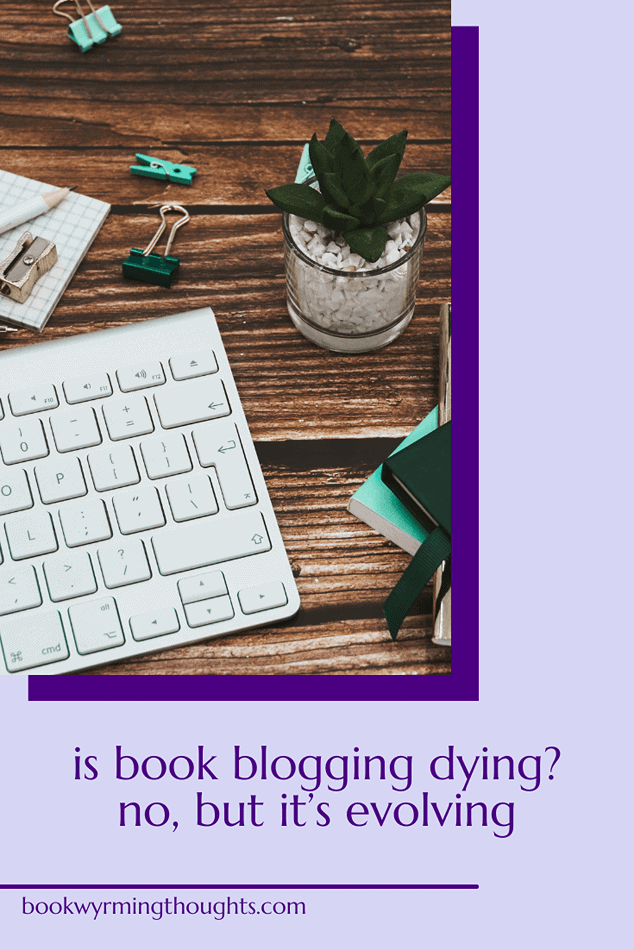“Book blogging is dying,” or “book blogging doesn’t matter” is a discourse we’re all well aware of. Every few months, something goes around in some shape or form: leaving book blogs completely out of ARC forms, leaving book bloggers out of the conversation when they’re clearly talking about book blogging in particular or a variety of platforms, or articles talking about how XYZ saved the publishing industry and therefore resulting in publishers putting more of their budgets toward sponsored posts through those platforms—we’ve heard them all. (It’s pretty exhausting, honestly.)
Blogging has come a long way since I first started back in 2012. Back then, it was a way for people to share their knowledge, opinions and news in the niche they were interested in, and social media was just starting out. This hasn’t changed, but with the rapid rise of social media in the past decade, it’s no wonder people ask if blogging is heading to a decline.
It probably doesn’t help that those who start out as bloggers eventually jumped the blogging ship for a different platform after low statistics and engagement (not that there aren’t other reasons; this is merely one reason). As much as numbers shouldn’t matter, it does hurt to see maybe two views a day and no engagement after pouring so much time and energy. Don’t we love hustle culture.
In a world where numbers are constantly used to measure our success outside of blogging, it makes sense that statistics feel validating. So can we really blame anyone for leaving blogging? Why bother with something that doesn’t work when you’ve found a place that works?
After all, in a fast-paced, rapidly changing world where most people hang out regularly on 3-5 platforms, there’s only so much time and energy we can invest into something. As much as we would love to extend our arms and legs everywhere, doing so just isn’t plausible without burning out. Most of us in the book community aren’t doing this as full-time jobs or making thousands of money that blue moon articles like to talk about the maybe 1-2% that do – we have outside jobs, families, social lives (not that I have any – in this pandemic? Ha.), etc.
- Book blogging isn’t dying, nor will it. Here’s why.
- We don’t own the content posted on social media.
- You’re at the mercy of whatever platform you’re on (because you don’t own it).
- Not everyone has social media, and not everyone feels social media is the place for them to start conversations.
- You can create long-form content on a blog, but you can’t do it on social media.
- You can repurpose your blog posts.
- Blogging is long term.
- The only competition is yourself.*
- So, no. Book blogging isn’t dying. It is, however, evolving.
Book blogging isn’t dying, nor will it. Here’s why.
I am of the opinion that book blogs are still relevant and will always remain relevant regardless of whatever social media platform(s) are highly active/trending. If Twitter sinks into a tragic death or Hive becomes mainstream, blogs will still be around. This opinion comes with a multitude of reasons, even if I might be biased. I’m a blogger, after all, and I did start before social media truly exploded into the giant mass it is today.
I can’t speak for the bloggers who started after me, nor can I speak for those who leave blogging for a different platform (because, again, everyone’s reasons are different, and it’s not necessarily the numbers). But with Twitter possibly imploding before the end of the year, I figured it was high time to pull it out of the draft dungeon and discuss why book blogging isn’t dying. (This could be applied to regular blogging as well, but we’re mostly here to talk about book blogging.)
NOTE: It’s very important to remember that this post isn’t to put another platform down or say that blogging is the best. Regardless of whatever platform you’re on, you should be valued for your work and the time you put into it.
We don’t own the content posted on social media.

Remember the Instagram/Facebook/WhatsApp Blackout of 2019? If there’s one thing all of us can take away from those hours of Internet Darkness, it’s that we don’t own the content we post on social media (and you should not keep your eggs in one basket).
Theoretically, we do. We created it and posted it on our account, right? Plagiarism isn’t okay, regardless if it’s social media or a blog, but at the end of the day, Meta owns Facebook and Instagram, and Elon Musk owns Twitter (or I guess X now). If they go down, they take the content with them. You can’t get that content back. They sure don’t care if they took your content with them, and the worst part? They don’t need to give you any warning to take down your content. It’s like blogging on non-self-hosted WordPress and Blogger: you’re at the mercy of the platform you’re on.
(Note: this isn’t to say self-hosted is better and free is the worst thing ever because self-hosted isn’t cheap, but you are at the mercy of WordPress and Google.)
Back when I wrote stuff and thought about being an author, I posted my stuff on a site called Miss Literati. Years ago, when I thought about looking at my old stuff because I was nostalgic (and maybe needed some story ideas when I still wanted to be an author), I found out that the site had shut down. No warnings, no emails, nothing. I sure won’t be getting those stories back. They’re embarrassing too, so at least that worked out. ¯\_(ツ)_/¯
Maybe you’re lucky if you back up those photos so you can reuse them, or you already reuse them. Most of us don’t really think about backing that content up, though. Hell, I wouldn’t even remember to back my blog up without my host and a plugin doing it automatically regularly. I definitely didn’t do it as often as I should have back on Blogger.
Anyway, here’s your regular reminder to back up your blogs, friends. If you have not done so lately, consider this a callout! (I woke up and chose violence, didn’t I.)
But when a site goes down, you still have your blog, especially if you’re self-hosted. You own the content, so you get to choose what you want to post or feature or when you want to stop blogging. You don’t lose your audience or readers, even if it’s just ten squirrels regularly reading every post with their nutty laptops sitting on acorns spilling nut crumbs over their nut screens. Even if you’re on a free platform, you can still choose what you want to post or when you want to stop.
You’re at the mercy of whatever platform you’re on (because you don’t own it).

Remember those days on Instagram and Twitter* when the posts of everyone you followed were in reverse chronological order by default? Yeah, those were good days. Now I’m lucky if I get an outbound link click on Twitter.
*Twitter has the option to switch to the latest tweets, at least, but it’s not the default.
Social media changes rapidly; what’s here today might not be here tomorrow. MySpace is a great example of a once huge platform that eventually got replaced by Facebook, but I think the ongoing situation on Twitter is the perfect one in this scenario. In just mere days and weeks after Musk brought Twitter, the platform has changed so much my head is spinning with keeping track of what’s going on. Will it survive in 2023? Who knows? But I know it’s going to hurt those who have made Twitter their primary platform/source of income.
Who’s to say another billionaire like Bezos won’t buy out TikTok next and come up with something like TikTok Plus, where you can buy the blue checkmark and be prioritized in feeds like Musk is doing with Twitter?
Though as of 2024, a potential TikTok ban passed into law, so while that’s not an example of being at the mercy of the platform you’re on, it certainly changes things and could turn into a Musk-Twitter situation.
Since you own your blog, you also get to choose what you want to do with it. If you want to do a static homepage and have all your blog posts in a different section, by all means, design your homepage to your happy heart’s desire. If you want to sort your posts in the default traditional reverse chronological order most blogs stick with, you can. Want to do it the other way around and put your oldest posts first? Not sure why anyone would, but you do you.
And, of course, if you want to sell it for a whopping $44 billion to Musk as well, then yes, that option is theoretically available.
You could argue that by being on WordPress, I’m at the mercy of whatever they come up with, with the prime example of switching from Classic to Block Editor a few years ago. You would not be wrong, but overhauling an editor does not affect how my content shows to my audience like social media does (if it even shows up).
Not everyone has social media, and not everyone feels social media is the place for them to start conversations.
It’s a little harder to have a meaningful conversation on Twitter and Instagram (I don’t mean in DMs). Most people scroll quickly as they like and retweet, and quite a handful only leave comments like “great photo” before moving on. This, of course, isn’t any different in blogging, but the comments section of a post has much less of a limit than on Twitter, where you have to get straight to the point or start a thread.
Some people just like the person-to-person conversation and engagement they get on a blog. Sure, you can get that same style of conversation on social media or slide in DMs, and anyone can still jump into a conversation in the comments section, but it’s also less likely to get lost in the flurry of other conversations. There’s a lot of noise, and it’s easy to lose track on social media.
Your blog might be the only way for some people to access your content for a variety of reasons: they might not have social media (or even want it), social media platforms are blocked for them, etc.
You can create long-form content on a blog, but you can’t do it on social media.

I don’t know about you, but I love reading blogs. With all due respect to YouTube, I don’t watch long-form content there. It just isn’t the same for me, and I prefer using YouTube for music videos and other fun content. I’d rather watch bloopers on a music video set than listen to a review.
That might work for some, and that’s perfectly valid—by no means is this meant to shun YouTube because I love that there are a multitude of ways to consume content. But YouTube aside, you can’t really create long-form content that goes into an in-depth analysis on Instagram like you can with a blog post. How do you do a full-blown tutorial in an Instagram caption or tweet? Social media is meant to be short, quick, and to the point – most people don’t hit “more” before they move on to the next thing. Sometimes you just can’t explain something that’s meant to be said in 2K words into 280 characters instead. It just doesn’t feel right because some things are more nuanced and complicated.
Imagine if my review for Love Between Fairy and Devil was on Twitter verbatim or my post about blogging under a pen name. That’s an extremely long thread. I might love writing them, but even I wouldn’t want to read all that on Twitter.
On a blog, you get a lot more freedom to express yourself. That’s not to say you can’t express yourself through social media, but for a wordy person like me, cutting myself on social media is a personal hell (feels like applying to colleges again when the maximum word count for essays were 250-500 words only). And just like in social media, when someone finds your content valuable, they’ll come back for more and potentially stay around for further content.
You can repurpose your blog posts.
Fun fact: I repurposed this post from a piece I wrote for an internship in 2019, which, funnily enough, was inspired by the same discourse that flows through the community every few months.
There’s a lot of material that you can work with blog posts that you can’t really translate with other platforms. Not only can you turn a blog post into a social media post, but you can also turn it into videos, infographics, emails, podcasts, etc. You can link back to previous posts, recreate a new social media post after a period of time, use it to inspire your other works or new posts, etc.
You can repurpose a social media post into other content, but you can’t link it to a previous or new post like you can with a blog post or search for it as easily as you can with a blog. While some will view some of your old posts and tweets to see if they want to follow you, most won’t go back and read your first social media post because that’s too much scrolling—who wants to go through 100K tweets or 2K Instagram photos? Not I.
“But Sophia,” you say, “I don’t want to read a 1-3K word blog post!” My most popular posts of all time would like to disagree (I will admit that 3K words is kind of stretching it, though), but would you rather read a 3K word blog post or go through 3K Instagram photos and read them word for word?
Blogging is long term.

Sometimes it feels like backlist books (and shows) don’t get enough attention; while many people are interested in recent upcoming books, there’s also a good handful of people who are interested in older ones too. This is similar to blogging; sometimes, it feels like recent posts don’t get enough attention, even though it really comes down to if it’s an evergreen or timely post.
Social media is designed to be more of an instant gratification where most of your likes and comments will roll in the first few days, but then it dies down. And once it dies down, it’s just dead (sometimes it’ll go viral later, but that’s rare). No one’s going to read your first Instagram post. In other words, social media doesn’t really have evergreen or timely options that will continue months later.
Blogging isn’t designed to be instantly gratifying in terms of social approval; it’s more about the long game. You never know when an older post will suddenly get a second life. My review for Meteor Garden died a tragic death two months after it went live. My impressions about Season 1, Episode 1 of Shadowhunters died a very tragic death a month after it went live, and views went down year by year (honestly, it was a shit post, and I forgot it existed). The former got a second life six months later, the latter got a second life four years later.
The only competition is yourself.*
On social media, we’re at the mercy of the algorithm. They can change it whenever they want, however they want, and you can’t stop them no matter how much you complain about no longer having reverse chronological order, the algorithm favoring multiple posts a day, or the pivot from a photo to a video and entertainment platform.
The only feed on the blog is yours, and if you have multiple bloggers, your co-bloggers and contributors. I highly doubt you’re competing with your co-bloggers, though. Anything that’ll normally catch someone’s attention to another feed is likely leading them deeper into your blog’s post archives. Only you get to define what your success is in blogging, and you get to choose whether you want to keep it chronological.
*Okay, you can disagree and say your (hopefully friendly) competition is other bloggers (at least in terms of SEO), and you’re not entirely wrong. Most of us are here for a good time, though, mostly because we’re doing this as a hobby (at least in book blogging) rather than full-time.
If you don’t want to look at numbers and stats, you don’t have to. I don’t check my stats regularly unless something majorly interesting happens, and I’m fascinated with how it plays out.
I decided to start Blogging Stats Transparency in 2022, something I plan to do annually. You can check view 2022’s stats and 2023’s stats.
So, no. Book blogging isn’t dying. It is, however, evolving.
As I mentioned at the beginning of this post, blogging has come a long way since I first started back in 2012, and not just for me changing as a person as I grew older. More bloggers started blogs, and other platforms (social media!) emerged and fell—the world marches on, industries change, and so does blogging.
I think Marie puts this really well back in 2020 about how book blogging has changed in five years: just having a book blog doesn’t feel like it’s enough, and people are talking more on social media because it’s quicker and easier to just scroll about on one platform. And that’s not all the changes that have occurred, too; Louise talks about the differences in book blogging then vs. now in August 2022, and I agree with a lot of points because I’ve also noticed a lot of those differences.
Personally, I’ve focused most of my energy on the blog over any other platform in recent years. I used to be extremely active on Twitter and was active on Instagram for about a year before deciding that keeping a balance between the three platforms was too much for me. I even thought about doing a booktube channel at some point, but then decided against it. And Goodreads, especially in groups, was definitely my jam for the first few years of blogging.
While I’m no longer actively posting on social media (aside from what’s automatically set up and the occasional tweet), I think it’s a powerful tool to use in addition to blogging because I’ve discovered new blogs and made friends that way through conversations beyond blogging. And while search engine makes up a huge portion of my traffic, social media has contributed. Maybe there has been less blog engagement over the past decade, or traffic has fluctuated up and down, but as long as there’s a need for information or entertaining content from a wide variety of perspectives in a written format, there will be a need for bloggers.

Sophia started blogging in February 2012 for the hell of it and is surprisingly still around. She has a GIF for nearly everything, probably listens to too much K-Pop and is generally in an existential crisis of sorts (she's trying her best). More of her bookish reviews and K-Pop Roundups can be found at The Arts STL.
If you enjoy her posts or found them helpful, consider tipping on KoFi!

I find social media platforms to be riddled with toxicity (even Goodreads to some extent), and I know I limit my time there. I even deleted accounts on a few. My blog is my happy place where I can talk about books. It does make me sad to see how many of my blogging friends have left (especially since 2020), but I’m still here and enjoying it.
Very thorough analysis, and I agree on all the points you made. SMs give instant gratification, are easier to manage, and cater to our need to dispatch things as quickly as possible – like when retweeting or liking a tweet instead of writing a (sometimes even long, GASP!) blog comment – but as you pointed out…”as long as there’s a need for information or entertaining content from a wide variety of perspectives in a written format, there will be a need for bloggers.” Also, everything in life cycles sooner or later, and I’m sure that blogs as a tool will end up getting popular again, though they probably won’t ever go back to being self-sufficient…they’ll be likely to need a “third leg” in the form of a social media account for the foreseeable future.
Yeahhhhh I definitely don’t think they’ll completely go back to being self-sufficient either, especially within the book community, although it’s definitely a nice thought to have! I also think it’ll be especially interesting with AI becoming more “mainstream” too, but maybe that’s an analysis for another day.
Excellent piece, Soph! I think Social Media changed so much too in the last 3-4 years, Twitter especially. It used to be my platform of choice in terms of where I’d spend my time, but even meeting & chatting with people doesn’t really happen anymore, and the algorithm definitely punishes those of us like me who limit their usage. It’s easy to get sad and feel like things are dying but really, it is just change and evolution.
Twitter was definitely my platform of choice too and I made a lot of friends on there (I miss Twitter chats especially!); bummer that it’s now seeming to circle the drain with every passing day. 😔
“Anyway, here’s your regular reminder to back up your blogs, friends. If you have not done so lately, consider this a callout! (I woke up and chose violence, didn’t I.)” – yes, yes you did and I feel called out because guess who is a bad bean and hasn’t backed up her blog in months? Moi. Oh well, I do have back ups of most of my other things because yes, one can never have too many. Guess I’m just living dangerously with my blog xD
I don’t consume book content on YouTube anymore, I do consume Kpop content, music videos, lifestyle content too and of course listen to music there. However I much prefer blogs for long form content, YouTube I enjoy more vlog style content mostly these days with the exception of Kpop things.
I love this post, it captures a lot of my thoughts on this topic too. Blogging isn’t for those who like instant gratification, it’s playing the long game and you’re going to need to be ok with things posts not doing the numbers overnight. Social media is like…a cute accessory for bloggers I feel like. We can exist in our own right without social media, plenty did prior to social media being a thing. However social media is like that fun bag or pair of earrings that we take with us, it can enhance our experience in a multitude of ways. (or you know give us a headache if your bag breaks and everything spills out of the bag and into a drain. idk where my brain went with it but we’ll roll with this sksksk)
I definitely have moved away from spending as much energy on my social media platforms like I used to. Twitter used to be my preferred social media platform but after my hiatus and now with Musk. It just…it’s not the same. You can’t really engage with people the same or just happen across a new blogger like before. Instagram is now the social media I use most, although I’m mainly using my stories and will post on my feed for myself. I like seeing my own pretty photos. I don’t know if I’ll try and use it to promote the blog, maybe once in a while. Anyway, I adore this post so much! 💜
CLOOOOO BACK UP YOUR BLOG RIGHT NOW.
“Social media is like…a cute accessory for bloggers I feel like.” Honestly, this is the perfect description and way better than I came up with (which I don’t even think was anything. 😂
I haven’t really been on Instagram all that much (creating photos is too much energy I don’t have), but maybe one I’ll also come back to it, maybe with a more casual, laidback style. Or maybe there’ll be a competitor that give us the missing hole that Twitter has been slowly leaving in us in the past year.
Gosh honestly I haven’t been very active on Twitter since the drama happened and chased me away, but that’s a totally different point. I agree with absolutely everything you wrote in this post, and reading this reminded me of why I wanted to come back to blogging consistently and putting my energy back into it. I’m excited to be back, and I’m hoping that I can remember to reflect on this post when I feel like I’m not getting the validation I want for the work I’m putting out. This was an amazing post <3